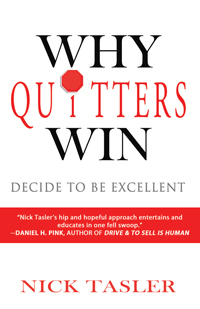 To focus, make smarter choices and lead in ways that are easier and more clear and satisfying for others to follow, we must first do one thing better according to Why Quitters Win author, Nick Taster. That trait is to quit doing things sooner that don't support your top goal. This is a vital talent to hone in this increasingly complex, information-flooded and connected world.
To focus, make smarter choices and lead in ways that are easier and more clear and satisfying for others to follow, we must first do one thing better according to Why Quitters Win author, Nick Taster. That trait is to quit doing things sooner that don't support your top goal. This is a vital talent to hone in this increasingly complex, information-flooded and connected world.
Perhaps The Most Dangerous Leadership Flaw Is Indecisiveness
Feeling overwhelmed by choices makes us slower to choose and less satisfied when we do, discovered The Paradox of Choice author, Barry Schwartz. Indecisiveness can be corrosive for us and for others in all parts of our lives. It robs of us of our time, dilutes relationships and stifles an organization's capacity to solve a problem or to seize an opportunity.
Sure some leaders make faulty snap judgments. The key to making smarter decisions sooner is to prioritize, then to actually stop pursuing many of the projects and ideas that don't serve the top priority. Dropping projects is actually one of the hardest things for us to do for many reasons, including behavior trip-ups such as "sunk cost," "confirmation bias" and "shiny object syndrome."
Here are four quick takeaways from Tasler's book:
1. Being a Decider Begets Greater Success for You and Those You Lead
"Decisiveness is the single most important success factor for people in today's information-saturated environment... exponentially true for leaders who must navigate a team in that environment," claims Tasler.
2. Quit Some Things Sooner
"At the heart of strategic thinking is the ability to focus on one strategy while consciously quitting the pursuit of others." This isn't just about stopping multi-tasking in real time, but, over time, to focus on a core strategy and to then force yourself and those you lead to let go of anything that does not add value to that strategy. Tasler cites Steve Jobs as an extreme example, referencing Walter Issacson's book about Jobs where, in a 90-minute meeting soon after returning to lead Apple, Jobs quickly cut many products, with the focused goal to "make four great products."
3. Create a Non-Action Plan
A major fallacy in our reasoning, according to Tasler, is that, "if we just get really clear about what we want, then all the other stuff will naturally evaporate from our consciousness." Yet guess which reminder was most effective in helping those in a psychologist, Peter Gollwitzer-led study fend off distractions: "Whenever the distraction arises, I will increase my efforts at hand!" "Whenever the distraction arises I will ignore it!"
The second sentence works much better because choosing to ignore something takes less mental effort than choosing to focus. Writes Tasler, "Even overachievers have a finite amount of mental capacity." That's why Tasler advises us to become more productive by devoting our prime thinking time to our prime priorities.
4. Tool To Help You Make Choices Based On Your Values
Learn your "personal pulse" -- what most matters to you -- so you can make decisions that most match those values. Notes Tasler, according to several studies, "eight universal values are shared by virtually every culture on earth from stock traders in the U.S. to farmers in South Africa..." You already make choices, of course. Why not gain further insight into how you choose? Your decision-making clarity comes from recognizing, in each situation, which one you would choose over another: humanity, relationships, authority, security, power, achievement, stimulation and freedom.
As Tasler once wrote, "to move ahead you have to know what to leave behind."
This post originally appeared on Forbes.com
